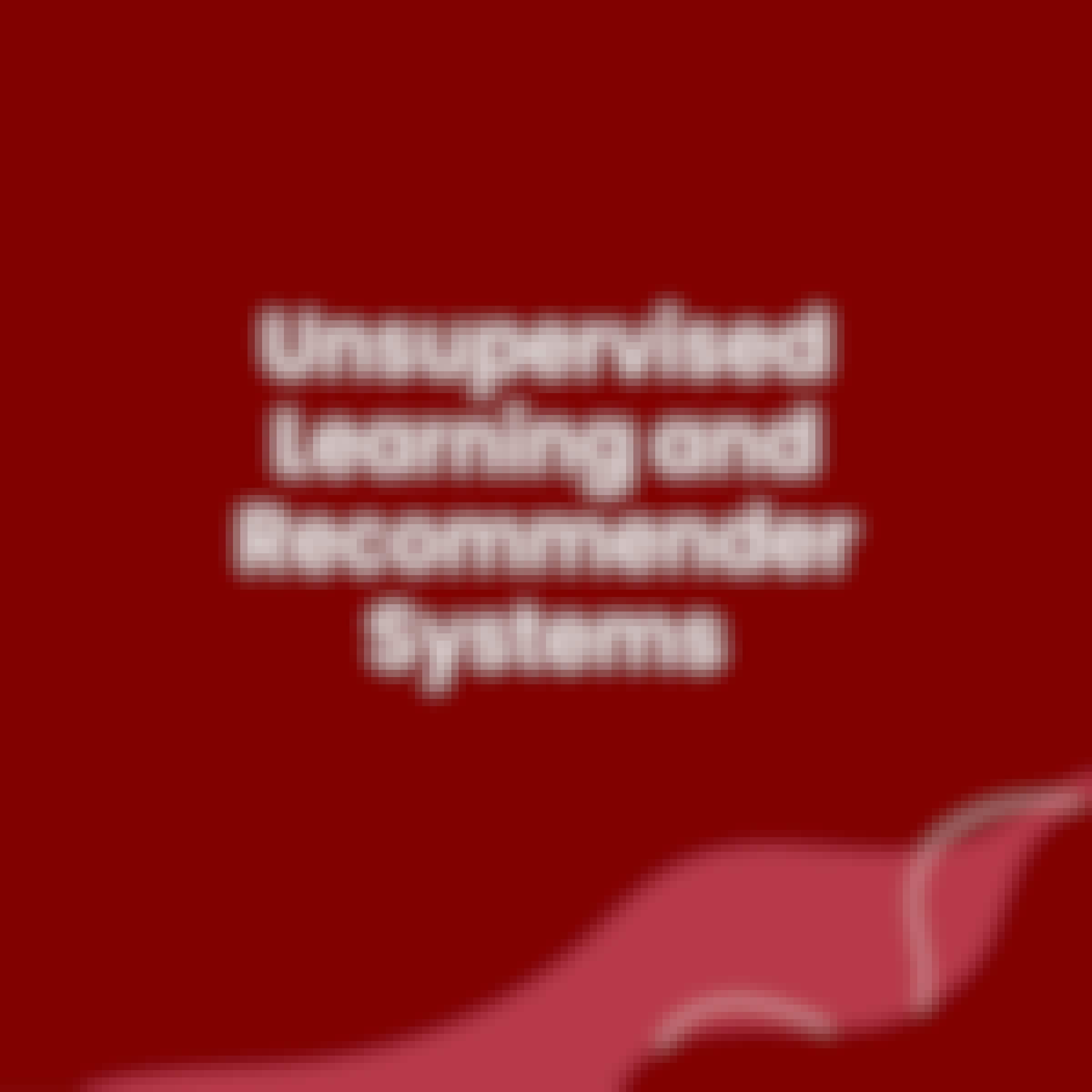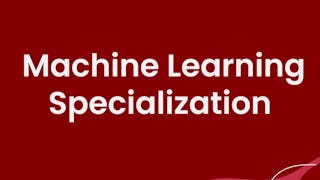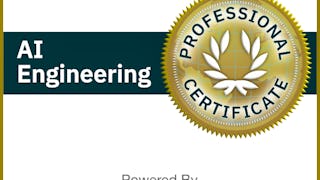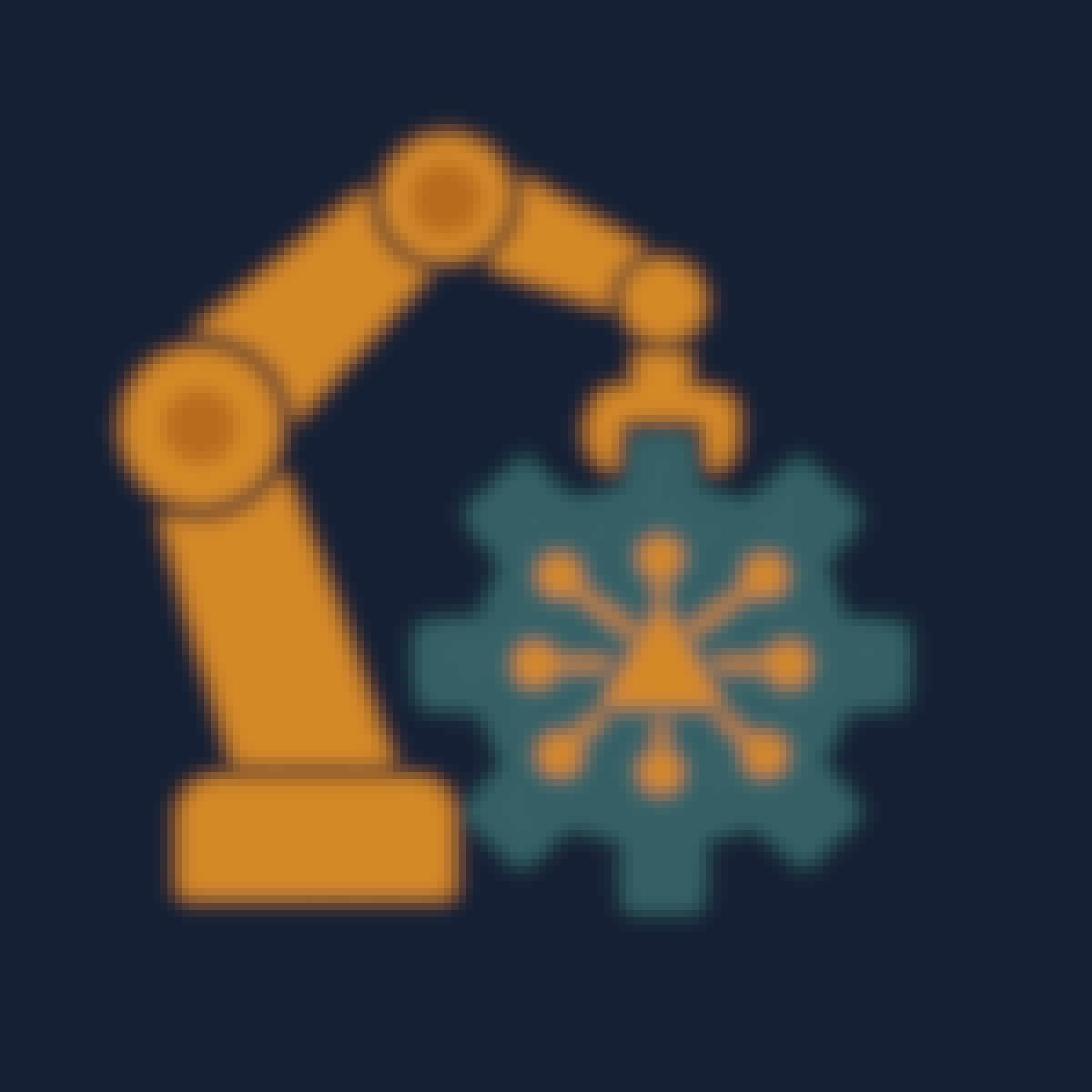- Browse
- Unsupervised Learning
Unsupervised Learning Courses Online
Study unsupervised learning for machine learning. Learn about clustering, dimensionality reduction, and anomaly detection techniques.
Explore the Unsupervised Learning Course Catalog
 Status: Free TrialFree TrialD
Status: Free TrialFree TrialDDeepLearning.AI
Skills you'll gain: Unsupervised Learning, Artificial Intelligence and Machine Learning (AI/ML), Applied Machine Learning, Data Ethics, Machine Learning, Supervised Learning, Artificial Intelligence, Reinforcement Learning, Deep Learning, Anomaly Detection, Dimensionality Reduction, Algorithms
4.9·Rating, 4.9 out of 5 stars5.3K reviewsBeginner · Course · 1 - 4 Weeks
 Status: Free TrialFree TrialDS
Status: Free TrialFree TrialDSMultiple educators
Skills you'll gain: Unsupervised Learning, Supervised Learning, Classification And Regression Tree (CART), Artificial Intelligence and Machine Learning (AI/ML), Applied Machine Learning, Machine Learning, Jupyter, Data Ethics, Decision Tree Learning, Tensorflow, Responsible AI, Scikit Learn (Machine Learning Library), NumPy, Predictive Modeling, Deep Learning, Artificial Intelligence, Reinforcement Learning, Random Forest Algorithm, Feature Engineering, Python Programming
4.9·Rating, 4.9 out of 5 stars37K reviewsBeginner · Specialization · 1 - 3 Months
 Status: NewNewStatus: Free TrialFree TrialU
Status: NewNewStatus: Free TrialFree TrialUUniversity of Michigan
Skills you'll gain: Unsupervised Learning, Anomaly Detection, Supervised Learning, Python Programming, Exploratory Data Analysis
Advanced · Course · 1 - 4 Weeks
 Status: Free TrialFree Trial
Status: Free TrialFree TrialSkills you'll gain: Prompt Engineering, Apache Spark, Large Language Modeling, Computer Vision, PyTorch (Machine Learning Library), Unsupervised Learning, Generative AI, PySpark, Supervised Learning, Keras (Neural Network Library), Feature Engineering, Deep Learning, Image Analysis, Reinforcement Learning, LLM Application, Applied Machine Learning, Natural Language Processing, Machine Learning, Python Programming, Data Science
Build toward a degree
4.6·Rating, 4.6 out of 5 stars21K reviewsIntermediate · Professional Certificate · 3 - 6 Months
 Status: Free TrialFree Trial
Status: Free TrialFree TrialSkills you'll gain: Unsupervised Learning, Dimensionality Reduction, Scikit Learn (Machine Learning Library), Machine Learning Algorithms, Feature Engineering, Machine Learning, Statistical Machine Learning, Text Mining, Data Mining, Data Science, Big Data, NumPy, Data Analysis, Algorithms, Natural Language Processing, Linear Algebra
4.7·Rating, 4.7 out of 5 stars347 reviewsIntermediate · Course · 1 - 3 Months
 Status: Free TrialFree Trial
Status: Free TrialFree TrialSkills you'll gain: Feature Engineering, Applied Machine Learning, Advanced Analytics, Machine Learning, Unsupervised Learning, Workflow Management, Data Ethics, Supervised Learning, Data Validation, Classification And Regression Tree (CART), Random Forest Algorithm, Decision Tree Learning, Python Programming, Performance Tuning
4.8·Rating, 4.8 out of 5 stars572 reviewsAdvanced · Course · 1 - 3 Months
What brings you to Coursera today?
 Status: Free TrialFree Trial
Status: Free TrialFree TrialSkills you'll gain: Unsupervised Learning, Supervised Learning, Feature Engineering, Applied Machine Learning, Scikit Learn (Machine Learning Library), Machine Learning, Predictive Modeling, Dimensionality Reduction, Regression Analysis, Decision Tree Learning, Classification And Regression Tree (CART), Statistical Modeling
4.7·Rating, 4.7 out of 5 stars18K reviewsIntermediate · Course · 1 - 3 Months
 Status: Free TrialFree TrialU
Status: Free TrialFree TrialUUniversity of Colorado Boulder
Skills you'll gain: Unsupervised Learning, Supervised Learning, Deep Learning, Machine Learning Algorithms, Dimensionality Reduction, Applied Machine Learning, Decision Tree Learning, Scikit Learn (Machine Learning Library), Matplotlib, Random Forest Algorithm, Machine Learning, Predictive Modeling, Keras (Neural Network Library), Artificial Neural Networks, Python Programming, Classification And Regression Tree (CART), Data Science, Tensorflow, Mathematical Modeling, Computer Vision
Build toward a degree
3.5·Rating, 3.5 out of 5 stars124 reviewsIntermediate · Specialization · 3 - 6 Months
 Status: Free TrialFree Trial
Status: Free TrialFree TrialSkills you'll gain: Dimensionality Reduction, Unsupervised Learning, Deep Learning, Machine Learning Algorithms, Random Forest Algorithm, Feature Engineering, Artificial Neural Networks, Supervised Learning, Statistical Machine Learning, Anomaly Detection, Machine Learning, Classification And Regression Tree (CART)
Intermediate · Course · 1 - 3 Months
 Status: NewNewStatus: PreviewPreview
Status: NewNewStatus: PreviewPreviewSkills you'll gain: Reinforcement Learning, Dimensionality Reduction, PyTorch (Machine Learning Library), Deep Learning, Generative AI, Pandas (Python Package), Scikit Learn (Machine Learning Library), Python Programming, Machine Learning, Artificial Neural Networks, Data Processing, Natural Language Processing, Feature Engineering, Predictive Modeling, Supervised Learning, Unsupervised Learning, Data Transformation, NumPy
Intermediate · Course · 3 - 6 Months
 Status: Free TrialFree TrialU
Status: Free TrialFree TrialUUniversity of Colorado Boulder
Skills you'll gain: Unsupervised Learning, Dimensionality Reduction, Machine Learning Algorithms, Data Science, Applied Machine Learning, Machine Learning, Scikit Learn (Machine Learning Library), Data Mining, Python Programming, Linear Algebra, NumPy, Algorithms, Exploratory Data Analysis
Build toward a degree
3.8·Rating, 3.8 out of 5 stars22 reviewsIntermediate · Course · 1 - 4 Weeks
 Status: NewNewStatus: PreviewPreviewN
Status: NewNewStatus: PreviewPreviewNNortheastern University
Skills you'll gain: Small Data, Deep Learning, Applied Machine Learning, PyTorch (Machine Learning Library), Unsupervised Learning, Tensorflow, Machine Learning, Generative AI, Data Synthesis, Supervised Learning, Artificial Intelligence, Computer Vision
Mixed · Course · 1 - 3 Months
In summary, here are 10 of our most popular unsupervised learning courses
- Unsupervised Learning, Recommenders, Reinforcement Learning: DeepLearning.AI
- Machine Learning: DeepLearning.AI
- Applied Unsupervised Learning in Python: University of Michigan
- IBM AI Engineering: IBM
- Unsupervised Machine Learning: IBM
- The Nuts and Bolts of Machine Learning: Google
- Machine Learning with Python: IBM
- Machine Learning: Theory and Hands-on Practice with Python: University of Colorado Boulder
- Advanced ML Algorithms & Unsupervised Learning: Packt
- Machine Learning with PyTorch and Scikit-Learn: Packt
Frequently Asked Questions about Unsupervised Learning
Unsupervised learning is a type of AI-based machine learning that lets people get information from untargeted data sets. The machines find and manage unlabeled data so people are able to take advantage of complex tools, such as dimension reduction algorithms and clustering. The result of unsupervised learning is that users are able to identify patterns and results that emerge from a raw data set. Instead of entering a data set or goal, someone using unsupervised learning gets to let the data sets and patterns emerge to find the algorithm that makes the most sense.
If you enjoy solving complex puzzles and detecting hidden information to answer questions, learning about unsupervised learning puts it within your grasp to identify and present data in a coherent, usable manner. Learning how tools like dimensionality reduction algorithms and clustering let you break raw data into subsets and categories or clusters that can be used to create models. This makes the information usable for decision-making purposes as well as for directing supervised AI to explore specific data subsets. The categorized information becomes more relevant, and the characteristics of data clusters become more recognizable.
Data scientists and machine learning (AI) specialists are two career opportunities that can emerge from picking up the study of unsupervised learning. Before studying unsupervised learning, it helps to have Python programming knowledge and know the basics of calculus, data cleaning, probability, statistics, linear algebra, and exploratory data analysis because unsupervised learning builds upon these skills. You might work exclusively in the field of IBM machine learning strategies, or you may work in another field, such as engineering, customer market segmentation, data mining, or predictive analysis. Studying unsupervised learning helps you stay on top of developments in machine learning to stay relevant as well as advance in your career if you're already in the field.
The online unsupervised learning courses on Coursera give you the knowledge and practical experience about machine learning so you're able to use tools like k-means clustering, cluster analysis, and principle component analysis (PCA) to apply unsupervised machine learning techniques in a business setting. Apply these new skills and newly learned information to real-life business situations. Our online unsupervised learning courses provide the information and opportunity for you to develop a skill set that helps you reach your career goals or earn college credits at your own pace, and on your own terms.
Online Unsupervised Learning courses offer a convenient and flexible way to enhance your knowledge or learn new Unsupervised Learning skills. Choose from a wide range of Unsupervised Learning courses offered by top universities and industry leaders tailored to various skill levels.
When looking to enhance your workforce's skills in Unsupervised Learning, it's crucial to select a course that aligns with their current abilities and learning objectives. Our Skills Dashboard is an invaluable tool for identifying skill gaps and choosing the most appropriate course for effective upskilling. For a comprehensive understanding of how our courses can benefit your employees, explore the enterprise solutions we offer. Discover more about our tailored programs at Coursera for Business here.










